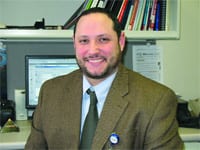A More Comfortable Hospital Stay Teen Mini Medical School Introduces High-schoolers to Health Careers
Henry Figueredo is the executive director of the Parent Information Center for Springfield Public Schools, and a former elementary school principal in the city.
From his beginnings as a physical education teacher, he has spent a successful 32 years in the Springfield system. Yet he wonders whether his career path would have been different if he had attended something like the Teen Mini Medical School at Baystate Medical Center.
“If these roots had been sown, if I’d had the opportunity to see the medical field, maybe that’s something I would have taken advantage of,” said Figueredo, who now sits on the board of the Baystate program, which introduces area high-school students to the workings of health care in a hospital setting.
The five-day program is offered twice per year, in the fall and spring, and most of the 30 students chosen are from Springfield. Baystate works with the city’s school system, and those of surrounding communities, to choose each semester’s class, based on students’ expressed interest in a health care career.
“This is for students who might be interested in a career in a health care field, but aren’t sure, or who might not be that familiar with Baystate,” said Ben Rodriguez, coordinator of the Baystate Springfield Educational Partnership (BSEP), noting that this year’s class is comprised largely of local students who were wait-listed last fall, reflecting the limited capacity of the program.
It’s also intended to have a positive impact on Baystate years down the line.
“This is part of a grow-your-own strategy,” Rodriguez said. “Baystate is working to expand a number of areas of the hospital, and this is one piece of the overall efforts that have been developed to address the issue of positions going unfilled. We know that this is a problem across the country.
“We have a strong pool of students from this area, and we need to help introduce them to these careers and foster them through the process,” he explained, noting that the Teen Mini Medical School is one small part of BSEP, a series of programs aimed at elementary, middle-school, and high-school students.
“That’s a lot of what BSEP does. We know that many of these students have gone on to other steps in BSEP, which is why we call it a pipeline model. In fact, a lot of kids come into our program through the Mini Medical School.”
For the Younger Set
Baystate has long offered a Mini Medical School for adults, a series of classes attended mainly by people with no medical career aspirations, but simply a desire to learn more about health care practices.
The teen version is modeled after the adult classes in some ways, but is geared toward the experience and maturity of high-school sophomores, said Rodriguez.
On the first night, the students are split up into small groups and taken on tours of different areas of Baystate, including the Wesson Women and Infants Unit, the Chestnut Surgery Center, and the Pathology Laboratory.
“I love to see the kids see an actual brain or lung that has a cancer spot on it, things like that,” Figueredo said of the lab tour. “I never get bored touring with the kids.”
In the days that follow, the students participate in a series of lectures and panel discussions on various areas of care, moderated by Baystate physicians. Last fall’s session featured programs on cardiology, neurology, pediatric diabetes, hospitalist care, and infectious diseases, among others. The agenda for the spring semester, scheduled for April, was still being formulated at press time.
“We assume that some of these students will be interested in the health field and want to pursue one of the avenues we can provide,” which include job shadowing, mentoring, and internships, said Rodriguez.
“This also provides one-on-one opportunities where they can speak directly to a neurosurgeon or a cardiologist. They can spend time in a hospital without coming for a broken leg or illness. It’s a more comfortable setting to learn about what goes on.”
At the final session, the students’ families may attend to see them receive certificates of completion and particupate in a panel discussion with human resources officials, talking about job opportunities, workforce needs, and what they look for in prospective employees.
“Sometimes the parents end up asking more questions than the teens,” said Rodriguez. “It’s great to see that kind of support.”
Jean Jackson, vice president of workforce planning for Baystate Health, said the experience can be an eye-opener for teenagers, even those who already have health care in mind as a potential career.
“People think of doctors and nurses when they think of hospitals,” said Jackson. “Kids aren’t always familiar with other aspects of health care unless they have family that work in medical settings.”
That’s why it’s good, she said, that the teens in the program get some information about what classes they should be taking well before their college years. “In many of these jobs, math and science are critical skills,” she said.
The Bottom Line
And that’s the idea, said Rodriguez — not only to show teenagers what’s available to them, but help them understand what they need to do now to prepare for such a career.
“This is our future workforce,” Jackson said of area high-schoolers. “How can we help them be successful in finding opportunities in health care?”
Clearly, the Teen Mini Medical School is a good start.

